初三英语复习材料常用动词习惯用法new
九年级英语动词应用知识点
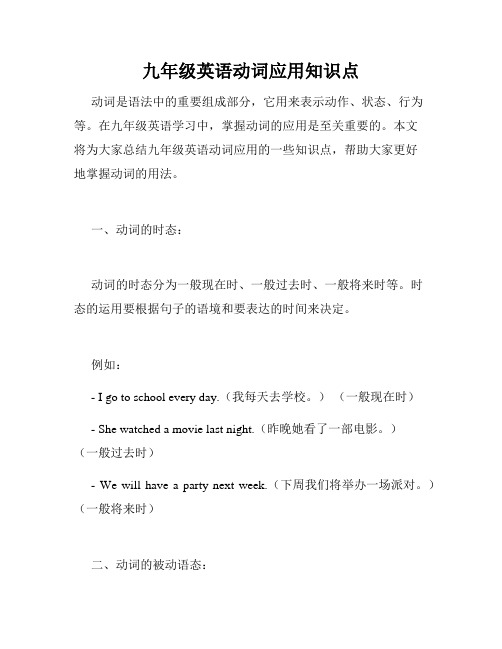
九年级英语动词应用知识点动词是语法中的重要组成部分,它用来表示动作、状态、行为等。
在九年级英语学习中,掌握动词的应用是至关重要的。
本文将为大家总结九年级英语动词应用的一些知识点,帮助大家更好地掌握动词的用法。
一、动词的时态:动词的时态分为一般现在时、一般过去时、一般将来时等。
时态的运用要根据句子的语境和要表达的时间来决定。
例如:- I go to school every day.(我每天去学校。
)(一般现在时)- She watched a movie last night.(昨晚她看了一部电影。
)(一般过去时)- We will have a party next week.(下周我们将举办一场派对。
)(一般将来时)二、动词的被动语态:被动语态是表示主语是动作的承受者而不是动作的执行者的句子结构。
在被动语态中,动作的执行者通常由介词by或者省略不表达。
例如:- The book was written by a famous author.(这本书是一位著名作家写的。
)- The flowers have been watered by the gardener.(花朵已经被园丁浇水了。
)三、动词的不定式和动名词形式:不定式通常由to+动词原形构成,它可以作为名词、形容词或副词的补语、定语等。
例如:- I want to play basketball with my friends.(我想和我的朋友们打篮球。
)(不定式作为动词的宾语)- He is too young to go to school.(他太小了,还不能上学。
)(不定式作为形容词补语)- She went to the park to walk her dog.(她去公园遛狗。
)(不定式作为目的状语)动名词是动词+ing形式,它可以作为名词、主语、宾语、定语等。
例如:- Swimming is my favorite sport.(游泳是我最喜欢的运动。
九年级英语动词知识点总结
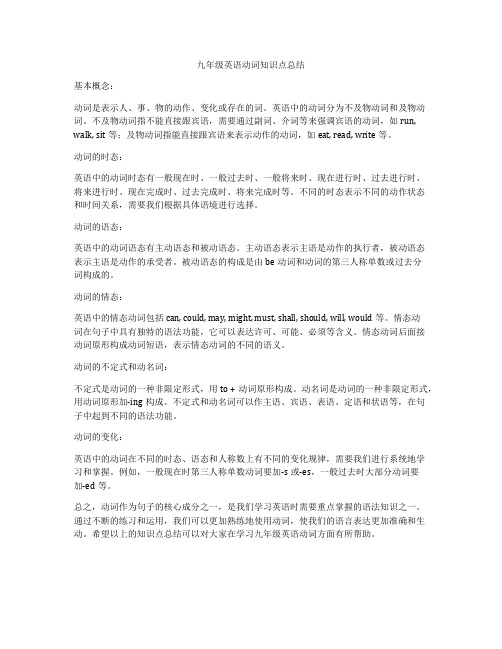
九年级英语动词知识点总结基本概念:动词是表示人、事、物的动作、变化或存在的词。
英语中的动词分为不及物动词和及物动词。
不及物动词指不能直接跟宾语,需要通过副词、介词等来强调宾语的动词,如run, walk, sit等;及物动词指能直接跟宾语来表示动作的动词,如eat, read, write等。
动词的时态:英语中的动词时态有一般现在时、一般过去时、一般将来时、现在进行时、过去进行时、将来进行时、现在完成时、过去完成时、将来完成时等。
不同的时态表示不同的动作状态和时间关系,需要我们根据具体语境进行选择。
动词的语态:英语中的动词语态有主动语态和被动语态。
主动语态表示主语是动作的执行者,被动语态表示主语是动作的承受者。
被动语态的构成是由be动词和动词的第三人称单数或过去分词构成的。
动词的情态:英语中的情态动词包括can, could, may, might, must, shall, should, will, would等。
情态动词在句子中具有独特的语法功能,它可以表达许可、可能、必须等含义。
情态动词后面接动词原形构成动词短语,表示情态动词的不同的语义。
动词的不定式和动名词:不定式是动词的一种非限定形式,用to + 动词原形构成。
动名词是动词的一种非限定形式,用动词原形加-ing构成。
不定式和动名词可以作主语、宾语、表语、定语和状语等,在句子中起到不同的语法功能。
动词的变化:英语中的动词在不同的时态、语态和人称数上有不同的变化规律,需要我们进行系统地学习和掌握。
例如,一般现在时第三人称单数动词要加-s或-es,一般过去时大部分动词要加-ed等。
总之,动词作为句子的核心成分之一,是我们学习英语时需要重点掌握的语法知识之一。
通过不断的练习和运用,我们可以更加熟练地使用动词,使我们的语言表达更加准确和生动。
希望以上的知识点总结可以对大家在学习九年级英语动词方面有所帮助。
九年级英语动词知识点总结

九年级英语动词知识点总结动词作为英语中的核心语法成分之一,在学习英语时起到了至关重要的作用。
掌握动词的正确用法及相关知识点,是学习英语的基础之一。
本文将全面总结九年级英语动词的知识点,帮助读者深入理解并正确运用动词。
一、动词的基本概念与分类动词是表示人、事物或现象的变化、行为或状态的词语。
根据动词的用法和意义,可以将动词分为不同的类别。
以下是常见的动词分类:1.实义动词(Main Verbs)实义动词是句子的谓语,用以表示具体的动作、状态或者感觉。
例如:- 动作动词(Action Verbs):run(跑)、eat(吃)、dance(跳舞)- 感官动词(Sensory Verbs):see(看见)、hear(听见)、smell(闻到)- 心理动词(Mental Verbs):think(思考)、believe(相信)、remember(记得)2.系动词(Linking Verbs)系动词用来连接主语和表语,表示主语的状态或特征。
常见的系动词有:be(是)、seem(看起来)、appear(出现)、feel(感觉)等。
3.助动词(Auxiliary Verbs)助动词用于构成句子的时态、语态、否定形式等,并且不能单独作谓语。
常见的助动词有:be(am, is, are)、do(does, did)和have(has, have)等。
二、动词的时态和语态时态和语态是动词的重要属性,它们能够表达动作发生的时间和动作的主动或被动关系。
以下是时态和语态的具体介绍:1.时态(Tense)时态指动作发生的时间,共有以下几种时态:- 一般现在时(Simple Present):表示经常性、习惯性的动作或客观事实。
- 一般过去时(Simple Past):表示过去发生的具体动作或存在的状态。
- 现在进行时(Present Continuous):表示现在正在进行的动作。
- 过去进行时(Past Continuous):表示过去某个时间正在进行的动作。
初三英语复习材料常用动词习惯用法

初三英语复习材料常用动词习惯用法常用动词习惯用法 1. allow sb to do sth 允许某人去做某事My father allowed me to go out for a walk after finishing my homework.2. asked sb (not) to do sth 叫某人做事某事My father asked me to study hard.He asked me not to swim alone.be asked to do sth 被叫去做某事/被邀请去做某事I was asked to have a dinner with them yesterday.3. be afraid to do sth 害怕做某事She is afraid to ask me questions.4. be afaid of doing sth 害怕做某事I am afraid of going out at night.5. be afaid of sth 害怕某物He is afraid of snakes.6. be amazed to do sth 对做某事感到惊讶He was amazed to meet the girl there. be amazed at sth 对某事感到惊讶they were amazed at the news.7. be busy doing/with sth 忙于做某事: I was busy washing my car at that time. 那时候我正忙于清洗我的车子。
I am busy with my work.8. be coming/going/leaving/fiying/moving/dy ingthe bus is coming/the dog is dying. 9. be excited to do sth 对做……感到兴奋Jacky was excited to travel there by plane.be excited at sthLily was excited at his words.be excited about doing sthhe was excited about passing the exam without going overing books.10. be frightened to do sth 害怕去做某事Sam is frightened to ride a horse. 11. be glad/happy to do sth 高兴去做某事she is happy to clean the blackboard with me.be pleased to do sth高兴做某事she was pleased to help the old man yesterday.be pleased with sth 对某事感到高兴/满意the teacher was pleased with my answer.12. be interested in sth/doing sth 对某事感兴趣/对做某事感兴趣she is interested in swimming in the river.My btother is interested in Chinese.13. be/get ready for/to do sthBe ready for sth 为某事做好了准备We are ready for the exam.Be ready to do sth 为做某事做好了准备We are ready to have a birthday party for her.get ready for sth为某事在做准备We are getting ready for the exam.get ready for sth 为做某事而做准备13. be sorry to do sth 对做某事感到抱歉14. be surprised to do sth 对做某事感到惊奇be surprised at sth 对某事感到惊奇15. be worth doing sth 值得做某事16. begin to do sthbegin/start to do/doing sth ( 开始去做某事 )17. can/be able to afford (to buy) sth 有能力购买……18. can/may/must do sth could/would/should/might do sth19. can’t wait to do sth 迫不急待地去做某事20. decide to do sth 决定去做某事make up one’s mind to do sth 下决心去做某事make a decision to do sth 对做某事作出决定21. deserve to do sth 值得/应该做……22. encourage sb to do sth 鼓励某人去做某事23. enjoy doing sth 乐意去做某事24. expect (sb) to do sth 期望去做某事25. fail to do sth 做某事失败succeed doing sth 成功做了某事26. finish doing sth 做完某事27. follow sb to do sth 跟随某人去做某事28. get sb to do sthmake sb do sthlet sb do sth (让某人做某事)29. get/have a chance to do sth 得到一个做某事的机会30. give/pass/show/lend/sell sb sth/sth to sbbuy/get/bring sb sth/sth for sb31. go on to do sth 继续做事go on doing sth 继续做事32. hate to do/doing sth 讨厌/不喜欢做某事33. have fun doing sth34. have problems doing sth 做某事遇到困难35. have sb do sthhave sth donehave sth to do 工有事要做36. hear sb do sth 听到某人做某事hear sb doing sth 听到某人正在做某事37. help to do sth 帮忙做某事help sb (to) do sth 帮助某人做某事38. hope/wish to do sth 希望做某事wish sb to do sth 希望某人做某事39. I t seems that 这像是……seem to do sthseem +adj40. It’s + adj+(for sb) to do sth . It’s+adj +(of sb) to do sth: It’s glad for him to hear the news.41. It takes sb some time/money todo sth . 花费某人多长时间做某事42. pay …for… cost spend…on….. it take …to do sth43. It’s best for sb to do sth. 对某人来说做某事是最好的had better do sth 最好做某事44. It’s time for sb to do sth 是某人做某事的时候了45. keep (on)doing sth 坚持做某事keep sb doing sth 让某人做某事keep sb from doing sth 阻止某人做某事keep sb/sth +adjkeep the book for 2 days 借这本书两天46. learn to do sth 学做某事learn sth from sb 向某人学习47. like to do/doing sth 喜欢做某事like sb to do sth 喜欢某人做某事48. need to do sthneed doing sth/to be doneneed sth needn’t do sth(需要做某事) 49. prefer to do sth rather than do sth 宁愿……而不愿……prefer doing sth to doing sth 喜欢做……胜过做……: I prefer reading books to going shopping. 比起购物来,我更爱读书。
英语复习常用动词习惯用法
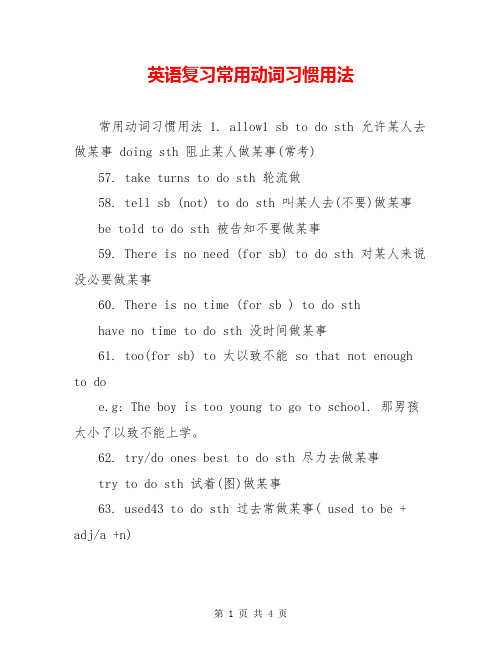
英语复习常用动词习惯用法常用动词习惯用法 1. allow1 sb to do sth 允许某人去做某事 doing sth 阻止某人做某事(常考)57. take turns to do sth 轮流做58. tell sb (not) to do sth 叫某人去(不要)做某事be told to do sth 被告知不要做某事59. There is no need (for sb) to do sth 对某人来说没必要做某事60. There is no time (for sb ) to do sthhave no time to do sth 没时间做某事61. too(for sb) to 太以致不能 so that not enough to doe.g: The boy is too young to go to school. 那男孩太小了以致不能上学。
62. try/do ones best to do sth 尽力去做某事try to do sth 试着(图)做某事63. used43 to do sth 过去常做某事( used to be + adj/a +n)e.g: Mr wang used to be a teacher worker. 王先生过去是一位工人。
I used to live in the country. 过去我住在农村。
64. want/would like to do sth 想做want/would like sb to do sth 想某人做feel like doing sth 喜爱做某事(注意like后接动词ing形式)65. warn44 sb (not) to do sth 警告某人做某事(或不要做某事)66. Why dont you do sthWhy not do sth ( 为什么不(表建议的句型,注意用动词原形) )表示建议的句型还有:What How about(如果是动词,要用ing形式)Shall we67. Would you like (sb) to do sth Yes, Id love to .68. Would you mind doing sth 你介意做某事吗Never mind/Not at all/of course45 not/certainlynot . (从不介意/一点也不介意/当然不会了)69. Would you please (not) do sth 你可不可以不做70. finish doing sth enjoy doing sth practise doing sth be good at doing sth be good at doing sth thank you for doing sth stop doing sth be good at doing sth give up doing sth mind doing sth stop sb from doing sth go on doing sth be busy doing sthsee/hear/watch sb doing sth feel like doing sth hate doing sth like doing sth do well in doing sth be afraid of doing sth be interested in doing sth make a contribution46 to sth/doing sth71. 非延续性动词(终止性动词)1.buy---have(has)had2.borrow---have(has)kept3.leave---have(has)been away4.go ---have(has)been away/ine ---have(has)here/in6.die47 ---have(has)been dead487.join---have(has)been a member of/in8.begin---have(has)on 8.stop---have(has)been overexample: 他的狗死了3天了.: His dog has been dead for three days. It is three days since49 his dogdied50. His dog died three days ago.72. 感官动词:(主动语态不带to)1.hear/see/watch sb do sth 或 2. hear/see/watch sb doing sth1. We often hear him sing the song.2. I saw51 him swimming in the river just now.被动语态带to:1. He is often heard to sing the song.役使动词: (主动语态不带to) make/let sb do sth.His father often makes him do this and that.被动语态带to:He is often made52 to do this and that by his father.。
初中英语常用动词习惯用法总结
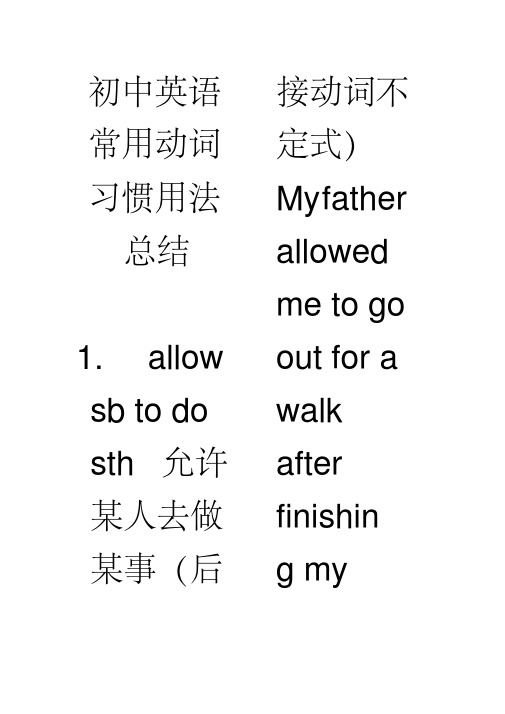
I am
was busy busy with
washing my work.
my car at 8. be
that time. coming/g
那时候我 oing/lea
正忙于清 ving/fiy
洗我的车 ing/movi
子。
ng/dying
(某些位
移动词用
进行时态 时表将 来) the bus is coming/t he dog is dying. 9. be excited to do sth
have a
afraid to
dinner
ask me
with them question
yesterday s.
.
4. be sth 害
afaid of 怕某物
doing sth He is
害怕做某 afraid of
事
snakes.
I am
6. be
afraid of amazedto
going out do sth
28.
29. get
让某人做 /have a
某事(后接 chance to
动词原形) do sth
get sb to 得到一个
do sth
做某事的
make 机会
sb do sth 30. giv
e/pass/s
how/lend /sell sb sth/sth to sb
ed in
We are
Chinese. ready for
13.
the exam.
be/get
Be ready
ready
to do sth
for/to do 为做某事
初三英语动词用法大全
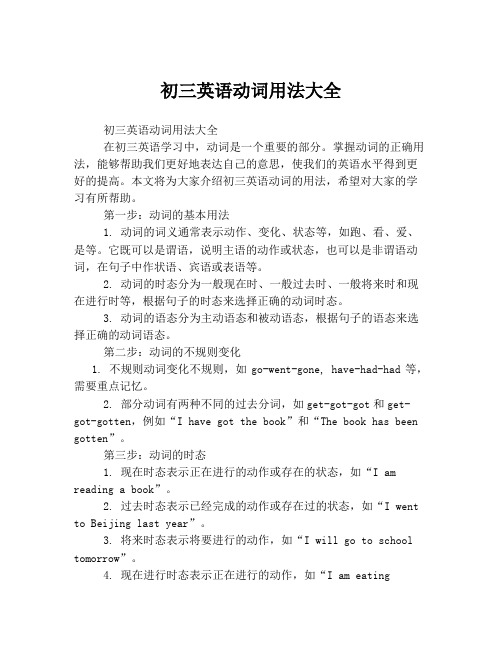
初三英语动词用法大全初三英语动词用法大全在初三英语学习中,动词是一个重要的部分。
掌握动词的正确用法,能够帮助我们更好地表达自己的意思,使我们的英语水平得到更好的提高。
本文将为大家介绍初三英语动词的用法,希望对大家的学习有所帮助。
第一步:动词的基本用法1. 动词的词义通常表示动作、变化、状态等,如跑、看、爱、是等。
它既可以是谓语,说明主语的动作或状态,也可以是非谓语动词,在句子中作状语、宾语或表语等。
2. 动词的时态分为一般现在时、一般过去时、一般将来时和现在进行时等,根据句子的时态来选择正确的动词时态。
3. 动词的语态分为主动语态和被动语态,根据句子的语态来选择正确的动词语态。
第二步:动词的不规则变化1. 不规则动词变化不规则,如go-went-gone, have-had-had等,需要重点记忆。
2. 部分动词有两种不同的过去分词,如get-got-got和get-got-gotten,例如“I have got the book”和“The book has been gotten”。
第三步:动词的时态1. 现在时态表示正在进行的动作或存在的状态,如“I am reading a book”。
2. 过去时态表示已经完成的动作或存在过的状态,如“I went to Beijing last year”。
3. 将来时态表示将要进行的动作,如“I will go to school tomorrow”。
4. 现在进行时态表示正在进行的动作,如“I am eatingdinner right now”。
第四步:动词的语态1. 主动语态表示主语是动作的执行者,其结构为人称代词/名词+ 动词原形。
2. 被动语态表示主语是动作的承受者,其结构为被动语态助动词(am/is/are/was/were)+动词过去分词。
3. 当需要强调动作的执行者时,应选用主动语态;当需要强调动作的承受者或不知道动作的执行者时,应选用被动语态。
初三英语知识点总结

初三英语知识点总结英语是我们在学习和生活中非常重要的语言。
熟练掌握英语不仅可以方便我们日常交流,更可以拓宽我们的视野,增加我们的竞争力。
因此,英语学习是我们在学生时代必须重视和努力的一项任务。
本文将对初三英语知识点进行总结,帮助初三同学们更好地复习和掌握英语知识。
一、词汇英语词汇量的积累是我们学好英语的基础,初三英语词汇量的要求也相对较高。
以下是初三英语常见的几类词汇:1. 常用动词:动词是英语语法中最为重要的一部分。
在初三英语中,常见的动词有:be动词(am、is、are);助动词(can、could、should、will等);情态动词(may、might、must、shall等);动词不定式(to do);动词的过去式和过去分词形式(例如,play的过去式是played,过去分词是played)。
2. 常用名词:初三英语中常见的名词包括:人物名词(如John, Mary等);地点名词(如New York, London等);时间名词(如January, Monday等);物品名词(如book, pen等)。
3. 常见形容词:形容词是一种对名词和代词进行形容的词汇。
初三英语中常用的形容词有:长短(long, short等);高低(tall, short等);美丑(beautiful, ugly等);快慢(fast, slow等)等。
4. 常见副词:副词是一种用来修饰动词、形容词、其他副词、句子的词汇。
初三英语中常见的副词有:时间副词(如now, then, today等);地点副词(如here, there等);方式副词(如quickly, loudly等)。
二、语法语法是英语学习中不可避免的一部分。
初三英语语法的部分内容包括:1. 名词名词在英语语法中十分重要。
初三英语中常见的名词有:普通名词(如dog, cat, chair等);专有名词(如Mary, London等);抽象名词(如freedom, courage等)。
九年级英语动词知识点

九年级英语动词知识点动词是英语中十分重要的一部分,它不仅可以帮助我们准确地表达自己的意思,还可以让句子更加丰富多彩。
在九年级英语学习中,学生们需要掌握一些常见的动词知识点,下面将介绍一些常见的动词形式和用法。
一、动词的基本形式动词的基本形式就是它的原形,通常以动词的原型出现,表示一种动作或状态。
比如:go, eat, play等。
二、动词的三单形式当主语是第三人称单数时,动词需要加-s或-es。
例如:he goes, she eats。
三、动词的过去式大部分动词的过去式是在词尾加-ed。
例如:walked, watched。
但也有一些动词需要根据规则进行变化,比如:go→went, eat→ate。
四、动词的进行时态动词的进行时态表示目前正在进行的动作。
构成方式是“be+动词的ing形式”。
例如:I am playing basketball.五、动词的完成时态动词的完成时态表示过去某个时间已经完成的动作。
构成方式是“have/has+动词的过去分词形式”。
例如:She has finished her homework.六、动词的被动语态动词的被动语态表示主语是动作的接收者而非执行者。
构成方式是“be+动词的过去分词形式”。
例如:The book is written by him.七、动词的情态动词情态动词是一类特殊的动词,用于表达建议、推测、能力等含义。
常见的情态动词有can, could, may, might, must, shall, should, will, would等。
八、动词的短语动词短语动词由一个动词和一个或多个副词或介词组成,具有独立的意义。
例如:give up, look after, take off等。
短语动词需要特别记住,因为它们的意思不能通过词汇的独立意义来推测。
九、动词的非谓语形式动词的非谓语形式有不定式、动词的ing形式和过去分词形式。
非谓语形式具有动词和其他词类的特点,可用作主语、宾语、定语、状语等。
初三英语复习材料常用动词习惯用法new
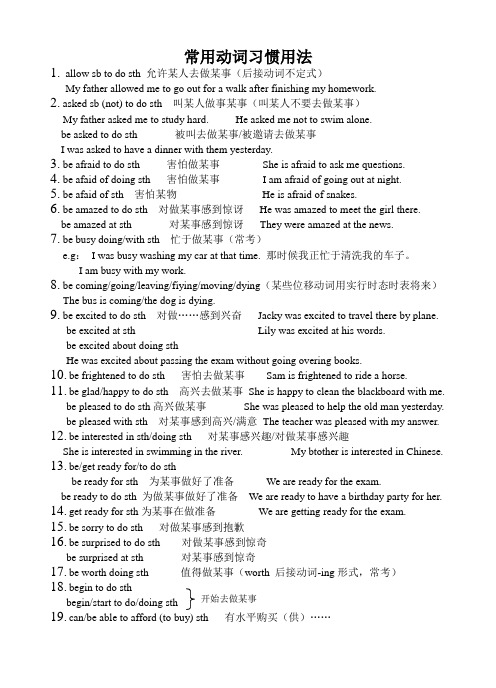
常用动词习惯用法1.allow sb to do sth 允许某人去做某事(后接动词不定式)My father allowed me to go out for a walk after finishing my homework.2.asked sb (not) to do sth 叫某人做事某事(叫某人不要去做某事)My father asked me to study hard. He asked me not to swim alone.be asked to do sth 被叫去做某事/被邀请去做某事I was asked to have a dinner with them yesterday.3.be afraid to do sth 害怕做某事She is afraid to ask me questions.4.be afaid of doing sth 害怕做某事I am afraid of going out at night.5.be afaid of sth 害怕某物He is afraid of snakes.6.be amazed to do sth 对做某事感到惊讶He was amazed to meet the girl there.be amazed at sth 对某事感到惊讶They were amazed at the news.7.be busy doing/with sth 忙于做某事(常考)e.g:I was busy washing my car at that time. 那时候我正忙于清洗我的车子。
I am busy with my work.8.be coming/going/leaving/fiying/moving/dying(某些位移动词用实行时态时表将来)The bus is coming/the dog is dying.9.be excited to do sth 对做……感到兴奋Jacky was excited to travel there by plane.be excited at sth Lily was excited at his words.be excited about doing sthHe was excited about passing the exam without going overing books.10.be frightened to do sth 害怕去做某事Sam is frightened to ride a horse.11.be glad/happy to do sth 高兴去做某事She is happy to clean the blackboard with me.be pleased to do sth高兴做某事She was pleased to help the old man yesterday.be pleased with sth 对某事感到高兴/满意The teacher was pleased with my answer.12.be interested in sth/doing sth 对某事感兴趣/对做某事感兴趣She is interested in swimming in the river. My btother is interested in Chinese.13.be/get ready for/to do sthbe ready for sth 为某事做好了准备We are ready for the exam.be ready to do sth 为做某事做好了准备We are ready to have a birthday party for her.14.get ready for sth为某事在做准备We are getting ready for the exam.15.be sorry to do sth 对做某事感到抱歉16.be surprised to do sth 对做某事感到惊奇be surprised at sth 对某事感到惊奇17.be worth doing sth 值得做某事(worth 后接动词-ing形式,常考)18.begin to do sthbegin/start to do/doing sth19.can/be able to afford (to buy) sth 有水平购买(供)……20. can/may/must do sth could/would/should/might do sth21. can ’t wait to do sth 迫不急待地去做某事22. decide to do sth 决定去做某事 make up one ’s mind to do sth 下决心去做某事(常考) make a decision to do sth 对做某事作出决定23. encourage sb to do sth 鼓励某人去做某事24. enjoy doing sth 喜欢做某事25. expect (sb) to do sth 期望去做某事26. fail to do sth 做某事失败succeed in doing sth 成功做了某事27. finish doing sth 做完某事(后接动词-ing 形式)(常考)28. follow sb to do sth 跟随某人去做某事29. get sb to do sth make sb do sthlet sb do sth have sb do sth30. get/have a chance to do sth 得到一个做某事的机会31. give/pass/show/lend/sell sb sth/sth to sb buy/get/bring sb sth/sth for sb 32. go on to do sth 继续做事(常考) go on doing sth 继续做事(常考) 33. hate to do/doing sth 讨厌/不喜欢做某事34. have fun doing sth = have a good time doing sth = enjoy oneself doing sth35. have problems/trouble/difficulty with sth 在…方面有问题/麻烦/困难 have problems/trouble/difficulty (in) doing sth 做某事遇到困难36. have sb do sth have sth done 使某物被… have sth to do 工有事要做37. hear sb do sth 听到某人做某事(后接动词原形,常考)hear sb doing sth 听到某人正在做某事(常见)38. help to do sth 帮忙做某事 help sb (to) do sth 帮助某人做某事 39. hope/wish to do sth 希望做某事 wish sb to do sth 希望某人做某事 40. ① I t seems that + 从句 这像是……② 人+seem to do sth ③ seem +adj41. I t’s + adj+(for sb) to do sth . e.g. It ’s important for us to learn English. It ’s+adj +(of sb) to do sth e.g. It ’s kind of him to help me.42. It takes sb some time/money to do sth . 花费某人多长时间做某事(常考) 43. pay …for … cost spend …on ….. it take …to do sth44. It ’s best for sb to do sth. 对某人来说做某事是最好的had better do sth 最好做某事 had better not do sth 最好不做某事45. It ’s time for sb to do sth 是某人做某事的时候了46. keep (on)doing sth 坚持做某事(常考)keep sb doing sth 让某人做某事(常考)让某人做某事(后接动词原形)让某人做某事(后接动词原形)keep sb from doing sth 阻止某人做某事(常考)keep sb/sth +adjkeep the book for 2 days 借这本书两天(不要用borrow或lend)47.learn to do sth 学做某事learn sth from sb 向某人学习48.like to do/doing sth 喜欢做某事like sb to do sth 喜欢某人做某事49.need to do sth 需要做某事sth needs doing /to be done 某事需要被……need sth needn’t do sth50.prefer to do sth rather than do sth 宁愿……而不愿……(常考)prefer doing sth to doing sth 喜欢做……胜过做……e.g: I prefer reading books to going shopping. 比起购物来,我更爱读书。
人教版九年级英语各单元动词总结及练习
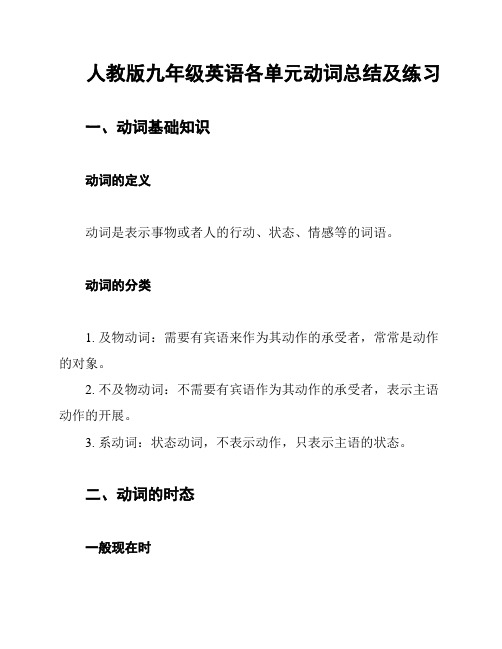
人教版九年级英语各单元动词总结及练习一、动词基础知识动词的定义动词是表示事物或者人的行动、状态、情感等的词语。
动词的分类1. 及物动词:需要有宾语来作为其动作的承受者,常常是动作的对象。
2. 不及物动词:不需要有宾语作为其动作的承受者,表示主语动作的开展。
3. 系动词:状态动词,不表示动作,只表示主语的状态。
二、动词的时态一般现在时表示现在正在进行的动作或者经常性发生的动作。
一般过去时表示发生在过去某个时间的动作,一般和具体时间状语连用。
一般将来时表示将要发生的动作或者存在的状态。
现在进行时表示现在正在进行的动作,通常由 be 动词 + 现在分词构成。
过去进行时表示过去某一时刻正在进行的动作,通常由 be 动词的过去式+ 现在分词构成。
现在完成时表示过去发生的某一件事情对现在造成的影响或者状态,由have/has + 过去分词构成。
过去完成时表示过去某个时间点已经完成的事情,由had + 过去分词构成。
三、动词的语态主动语态表示主语是动作的执行者。
被动语态表示主语是动作的承受者。
四、动词的用法1. 动词不定式动词不定式是由 to + 动词原形构成。
2. 动词-ing 形式动词-ing 形式表示正在进行的动作。
3. 动词的原形动词的原形是指动词的基本形式,通常是由动词词根加上词尾构成。
4. 动词的过去式动词的过去式是指表示过去时间的动作的时态形式,通常是由原形加上-ed 构成。
5. 动词的过去分词动词的过去分词是表示完成或者被动的动作,通常是由have/has + 过去分词构成。
五、动词的练1. I (study) English every day.2. They (play) basketball last weekend.3. He (be) a teacher for 5 years.4. She (not watch) TV yesterday.5. We (finish) our work already.答案:1. study2. played3. has been4. didn't watch5. have finished。
中考重点常见词汇和短语的用法
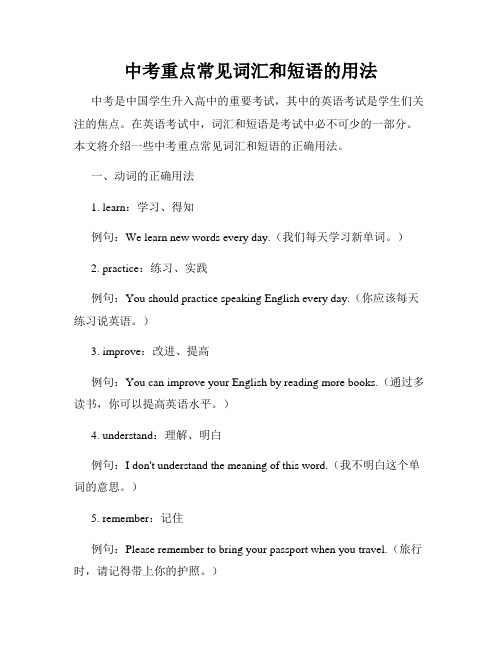
中考重点常见词汇和短语的用法中考是中国学生升入高中的重要考试,其中的英语考试是学生们关注的焦点。
在英语考试中,词汇和短语是考试中必不可少的一部分。
本文将介绍一些中考重点常见词汇和短语的正确用法。
一、动词的正确用法1. learn:学习、得知例句:We learn new words every day.(我们每天学习新单词。
)2. practice:练习、实践例句:You should practice speaking English every day.(你应该每天练习说英语。
)3. improve:改进、提高例句:You can improve your English by reading more books.(通过多读书,你可以提高英语水平。
)4. understand:理解、明白例句:I don't understand the meaning of this word.(我不明白这个单词的意思。
)5. remember:记住例句:Please remember to bring your passport when you travel.(旅行时,请记得带上你的护照。
)二、名词的正确用法1. exam:考试例句:I have an English exam tomorrow.(我明天有一场英语考试。
)2. grade:年级、分数例句:He is in the fifth grade.(他在五年级。
)3. subject:科目例句:Math is my favorite subject.(数学是我最喜欢的科目。
)4. book:书例句:I borrowed a book from the library.(我从图书馆借了本书。
)5. knowledge:知识例句:Reading can broaden our knowledge.(阅读可以扩大我们的知识面。
)三、形容词和副词的正确用法1. difficult:困难的例句:This math problem is difficult to solve.(这个数学问题很难解。
中考英语常见动词总结归纳

中考英语常见动词总结归纳英语中动词是构成句子的重要组成部分,对于中考英语考试来说,掌握常见的动词用法是非常重要的。
在本文中,我们将对中考英语常见动词进行总结归纳,以帮助同学们更好地备考。
一、动词的基本形式和变化规则动词的基本形式是不定式,通常是由动词原形加上to构成,例如:to eat, to play等。
动词的变化形式包括一般现在时、一般过去时和现在进行时。
下面是一些常见动词的变化规则:1.一般现在时:动词原形(第三人称单数形式加s)例如:- I eat an apple every day.- He eats an apple every day.2.一般过去时:动词过去式(一般加-ed或-d,不规则动词除外)例如:- I played soccer yesterday.- He played soccer yesterday.3.现在进行时:be动词(am/is/are)+动词ing形式例如:- I am eating an apple.- He is eating an apple.二、常见动词的用法总结1. 喜欢:likelike是一个常见的动词,用于表示喜欢或者喜爱。
它可以用于一般现在时和一般过去时。
例如:- I like playing basketball.- She liked the movie.2. 看:seesee是一个常见的动词,用于表示看见或者观看。
它可以用于一般现在时、一般过去时和现在进行时。
例如:- I see a bird in the sky.- She saw a movie last night.- They are seeing a doctor now.3. 学习:studystudy是一个常见的动词,用于表示学习或者研究。
它可以用于一般现在时和现在进行时。
例如:- I study English every day.- He is studying for the exam.4. 听:listenlisten是一个常见的动词,用于表示听或者倾听。
九年级新课标英语知识点

九年级新课标英语知识点-- By OpenAI一、动词时态和语态在九年级新课标英语中,动词时态和语态是学习的重点之一。
了解和正确运用各种时态和语态形式,对于理解和表达英语语言的准确性非常重要。
1. 一般现在时态(Simple Present Tense)一般现在时用于描述现阶段的事实、习惯或者经常性的动作。
例如:- I play basketball every weekend.(我每周末打篮球。
)- She lives in London.(她住在伦敦。
)2. 一般过去时态(Simple Past Tense)一般过去时用于过去发生的动作或者状态。
例如:- They watched a movie last night.(他们昨晚看了一部电影。
)- He lived in China for five years.(他在中国住了五年。
)3. 一般将来时态(Simple Future Tense)一般将来时用于表示将来的动作或者状态。
例如:- We will have a party next week.(我们下周将举行一次聚会。
)- She is going to visit her grandparents.(她打算去看望她的祖父母。
)4. 现在进行时态(Present Continuous Tense)现在进行时用于表示此刻正在进行的动作。
例如:- I am studying for the exam.(我正在为考试而学习。
)- They are playing football in the park.(他们正在公园踢足球。
)5. 过去进行时态(Past Continuous Tense)过去进行时用于表示过去某一时间段内正在进行的动作。
例如:- She was reading a book when I called her.(我给她打电话的时候,她正在读一本书。
)- We were watching a movie at that time.(那时候我们正在看电影。
初中英语语法一本通 22常用动词习惯用法及句型

第八章常用动词习惯用法及句型一、常用动词习惯用法。
1、allow sb to do sth 允许某人去做某事(后接动词不定式)allow doing sth 允许做某事(动词-ing形式)2、asked sb (not) to do sth 叫某人做事某事(叫某人不要去做某事)be asked to do sth 被叫去做某事3、be afraid to do sth 害怕做某事4、be afaid of doing sth 害怕做某事5、be amazed to do sth 对做某事感到惊讶be amazed at sth 对做某事感到惊讶6、be busy doing/with sth 忙于做某事(常考)例如:I was busy washing my car at that time. 那时候我正忙于清洗我的车子。
7、be coming/ going/ leaving/ flying/ moving (某些位移动词用进行时态时表将来)8、be excited to do sth 对做……感到兴奋be excited at sthbe excited about doing sth9、be frightened to do sth 害怕去做某事10、be glad/happy to do sth 高兴去做某事be pleased to do sth = be pleased with sth 对某事感到高兴11、be interested in sth/doing sth 对某事感兴趣/对做某事感兴趣12、be ready to do sth = get ready to do sth13、be sorry to do sth 对做某事感到抱歉14、be surprised to do sth 对做某事感到惊奇be surprised at sth 对某事感到惊奇15、be worth doing sth 值得做某事(worth 后接动词-ing形式,常考)16、begin to do sthbegin/start to do/doing sth17、can/be able to afford (to buy) sth 有能力购买(供)……18、can/may/must do sth could/would/should/might do sth19、can’t wait to do sth 迫不急待地去做某事20、decide to do sth 决定去做某事make up one’s mind to do sth 下决心去做某事(常考)make a decision to do sth 对做某事作出决定21、deserve to do sth 值得/应该做……22、encourage sb to do sth 鼓励某人去做某事23、enjoy doing sth 乐意去做某事24、expect (sb) to do sth 期望去做某事25、fail to do sth 做某事失败succeed doing sth 成功做了某事26、finish doing sth 做完某事(后接动词-ing形式)(常考)27、follow sb to do sth 跟随某人去做某事28、get sb to do sth = make sb do sth = let sb do sth29、get/have a chance to do sth 得到一个做某事的机会30、give/pass/show/lend/sell sb sth/ sth to sbbuy/get/bring sb sth/ sth for sb31、go on to do sth 继续做事(常考)go on doing sth 继续做事(常考)32、hate to do/doing sth 讨厌/不喜欢做某事33、have fun doing sth34、have problems doing sth 做某事遇到困难35、have sb do sthhave sth donehave sth to do 工有事要做36、hear sb do sth 听到某人做某事(后接动词原形,常考)hear sb doing sth 听到某人正在做某事(常见)37、help to do sth 帮忙做某事help sb (to) do sth 帮助某人做某事38、hope/wish to do sth 希望做某事wish sb to do sth 希望某人做某事39、I t seems that 这像是……(后接从句)seem to do sthseem +adj40、It’s + adj+(for sb) to do sth .It’s+ adj +(of sb) to do sth例如:It’s glad for him to hear the news.41、It takes sb some time to do sth . 花费某人多长时间做某事(常考)42、It’s best for sb to do sth. 对某人来说做某事是最好的had better do sth 最好做某事(注意had没有时态和人称的变化,better后接动词原形)43、It’s time for sb to do sth 是某人做某事的时候了44、keep (on)doing sth 坚持做某事(常考)keep sb doing sth 让某人做某事(常考)keep sb from doing sth 阻止某人做某事(常考)keep sb/sth +adjkeep the book for 2 days 借这本书两天(不要用borrow或lend)45、learn to do sth 学做某事learn sth from sb 向某人学习46、like to do/doing sth 喜欢做某事like sb to do sth 喜欢某人做某事47、need to do sthneed doing sth/to be doneneed do sth48、prefer to do sth rather than do sth 宁愿……而不愿……(常考)prefer doing sth to doing sth 喜欢做……胜过做……例如:I prefer reading books to going shopping. 比起购物来,我更爱读书。
英语九年级动词知识点

英语九年级动词知识点一、动词的定义和分类动词是指表示人或物的动作、状态或存在的词性,在句子中通常作谓语或补足语。
根据不同的特点,动词可以分为以下几类:1. 及物动词(Transitive Verbs):表示动作的同时需要接收动作的对象。
例如:Tom reads a book.(汤姆读一本书。
)2. 不及物动词(Intransitive Verbs):表示动作的同时不需要接收动作的对象。
例如:The bird sings.(这只鸟唱歌。
)3. 动词短语(Phrasal Verbs):由一个动词和一个或多个副词或介词组成的短语。
例如:She always looks after her little sister.(她总是照顾她的小妹妹。
)4. 连系动词(Linking Verbs):用于连接主语和表语,并给主语陈述状态。
例如:She feels happy.(她感到快乐。
)二、动词的时态动词根据不同的时态形式可以表达不同的时间和状态。
常见的时态有以下几种:1. 一般现在时(Simple Present Tense):表示经常性的、习惯性的或客观真理的动作。
例如:I eat breakfast every day.(我每天吃早餐。
)2. 一般过去时(Simple Past Tense):表示过去发生的动作或状态。
例如:They played football yesterday.(他们昨天踢足球。
)3. 现在进行时(Present Progressive Tense):表示现在正在进行的动作。
例如:She is reading a book now.(她正在读一本书。
)4. 过去进行时(Past Progressive Tense):表示过去某个时间段内正在进行的动作。
例如:We were watching a movie at that time.(我们那时正在看电影。
)5. 现在完成时(Present Perfect Tense):表示过去发生的动作对现在产生的影响或结果。
中考英语高频短语和习惯用法
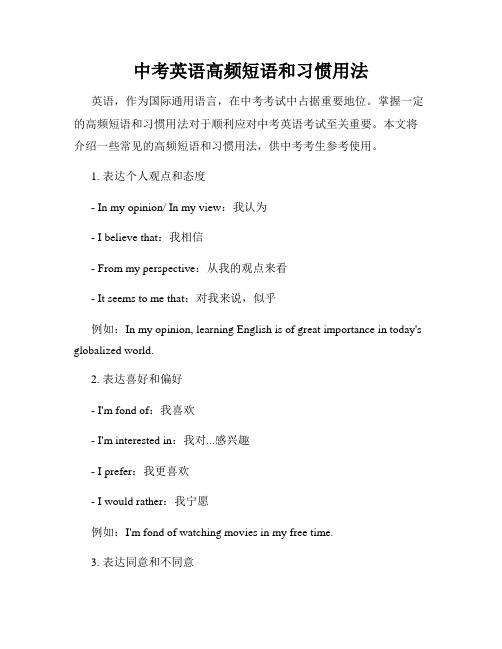
中考英语高频短语和习惯用法英语,作为国际通用语言,在中考考试中占据重要地位。
掌握一定的高频短语和习惯用法对于顺利应对中考英语考试至关重要。
本文将介绍一些常见的高频短语和习惯用法,供中考考生参考使用。
1. 表达个人观点和态度- In my opinion/ In my view:我认为- I believe that:我相信- From my perspective:从我的观点来看- It seems to me that:对我来说,似乎例如:In my opinion, learning English is of great importance in today's globalized world.2. 表达喜好和偏好- I'm fond of:我喜欢- I'm interested in:我对...感兴趣- I prefer:我更喜欢- I would rather:我宁愿例如:I'm fond of watching movies in my free time.3. 表达同意和不同意- I agree with:我同意- I disagree with:我不同意- I think so too:我也这么认为- That's true:那是真的例如:I agree with the idea that students should wear school uniforms.4. 表达建议和要求- You should/ ought to:你应该- It's advisable to:建议- Could you please:你能,请例如:You should study harder if you want to improve your English.5. 表达感觉和状态- I feel:我感觉- I'm happy/ sad/ tired:我开心/难过/疲倦- I'm excited about:我对...感到兴奋- I'm worried about:我为...担心例如:I feel nervous before taking an exam.6. 表达原因和结果- Because:因为- So:所以- As a result:因此- Therefore:因此例如:Because of the heavy rain, the baseball game was canceled.7. 表达经历和经验- I have ever:我曾经...- I have never:我从来没有...- I have been to:我去过...- I have learned:我学到了...例如:I have never been to Beijing, but I really want to visit there someday.8. 表达目的和计划- In order to:为了- To:为了- I plan to:我计划- I intend to:我打算例如:In order to improve my English speaking skills, I practice with a native speaker every week.以上是一些常见的中考英语高频短语和习惯用法,掌握这些短语和用法能够帮助考生在中考英语考试中取得好成绩。
初中英语总复习知识点归纳(基本全了)
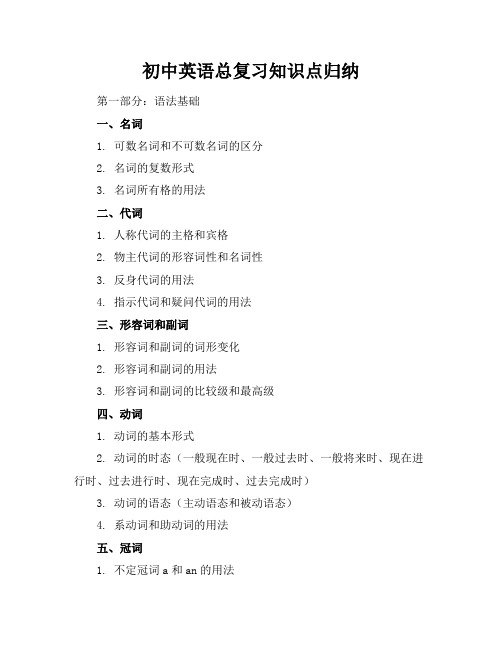
初中英语总复习知识点归纳第一部分:语法基础一、名词1. 可数名词和不可数名词的区分2. 名词的复数形式3. 名词所有格的用法二、代词1. 人称代词的主格和宾格2. 物主代词的形容词性和名词性3. 反身代词的用法4. 指示代词和疑问代词的用法三、形容词和副词1. 形容词和副词的词形变化2. 形容词和副词的用法3. 形容词和副词的比较级和最高级四、动词1. 动词的基本形式2. 动词的时态(一般现在时、一般过去时、一般将来时、现在进行时、过去进行时、现在完成时、过去完成时)3. 动词的语态(主动语态和被动语态)4. 系动词和助动词的用法五、冠词1. 不定冠词a和an的用法2. 定冠词the的用法3. 不使用冠词的情况六、连词1. 并列连词的用法2. 从属连词的用法七、介词1. 常用介词的用法2. 介词短语的结构和用法八、数词1. 基数词和序数词的用法2. 分数、小数和百分数的表达九、感叹词1. 感叹词的用法十、疑问词1. 疑问词的用法十一、句型结构1. 简单句的五种基本句型2. 并列句和复合句的结构和用法十二、主谓一致1. 主谓一致的原则2. 主谓一致的特殊情况十三、倒装句1. 完全倒装和部分倒装的区别2. 常见的倒装句型十四、省略句1. 省略句的结构和用法十五、强调句1. 强调句的结构和用法十六、虚拟语气1. 虚拟语气的用法十七、情态动词1. 情态动词的用法十八、非谓语动词1. 非谓语动词的分类和用法十九、固定搭配1. 常见的固定搭配二十、习惯用语和俚语1. 常见的习惯用语和俚语第二部分:词汇与短语一、词汇记忆方法1. 词根词缀记忆法2. 同义词和反义词记忆法3. 分类记忆法4. 联想记忆法二、常见词汇和短语1. 常用动词短语2. 常用形容词短语3. 常用介词短语4. 常用连词短语5. 常用固定搭配三、词汇辨析1. 形近词辨析2. 意思相近的词辨析3. 语境辨析四、词汇应用1. 词汇在句子中的应用2. 词汇在段落中的应用3. 词汇在文章中的应用五、词汇扩展1. 通过阅读扩展词汇2. 通过听力扩展词汇3. 通过口语和写作扩展词汇六、词汇复习策略1. 制定词汇复习计划2. 定期进行词汇测试3. 反复记忆和复习第三部分:阅读理解一、阅读技巧1. 快速阅读2. 精读3. 猜词技巧4. 理解文章主旨和大意5. 找出文章中的细节信息二、阅读题型1. 主旨大意题2. 细节理解题3. 推理判断题4. 词义猜测题5. 观点态度题三、阅读材料1. 故事类文章2. 议论文3. 说明文4. 应用文5. 新闻报道四、阅读理解策略1. 预览文章和首段2. 扫读文章找出关键词3. 仔细阅读理解文章内容4. 回答问题时注意关键词和语境5. 验证答案是否符合文章内容第四部分:写作技能一、写作技巧1. 确定写作目的和主题2. 拟定写作提纲3. 运用适当的句型和词汇4. 保持文章逻辑清晰5. 注意文章格式和标点符号二、写作题型1. 记叙文2. 议论文3. 说明文4. 应用文5. 日记和书信三、写作素材1. 人物描写2. 地点描写3. 事件描写4. 情感表达5. 观点陈述四、写作策略1. 多读优秀范文2. 多练习写作3. 请教老师和同学4. 反复修改和润色5. 保持写作兴趣和热情第五部分:听力理解一、听力技巧1. 预测听力内容2. 抓住关键词和关键信息4. 边听边记笔记5. 理解对话和独白的逻辑关系二、听力题型1. 简单听力理解题2. 听力细节理解题3. 听力推理判断题4. 听力主旨大意题5. 听力词义猜测题三、听力材料1. 对话2. 独白3. 新闻报道4. 广播节目5. 电影和电视剧片段四、听力理解策略1. 预览问题和选项2. 仔细听录音,注意关键词3. 根据听力内容进行推理和判断4. 选择最符合听力内容的答案5. 检查答案是否符合题意第六部分:口语表达一、口语技巧1. 准备话题和内容3. 保持语速适中4. 注意语法和词汇的准确性5. 保持自信和流畅二、口语题型1. 自我介绍2. 话题讨论3. 角色扮演4. 观点陈述5. 回答问题三、口语素材1. 日常生活话题2. 学校生活话题3. 社会热点话题4. 个人兴趣爱好话题5. 旅游和文化话题四、口语表达策略1. 多听多说,提高口语能力2. 模仿优秀的口语表达3. 与老师和同学进行口语练习4. 参加英语角和口语比赛5. 记录自己的口语表达,进行反思和改进第七部分:综合技能一、综合技巧1. 综合运用语法、词汇、阅读、写作、听力和口语等技能2. 注重语言的实际运用能力3. 提高语言的综合运用水平4. 培养跨文化交际能力5. 保持学习英语的兴趣和动力二、综合题型1. 完形填空2. 阅读理解3. 写作4. 听力理解5. 口语表达三、综合复习策略1. 制定综合复习计划2. 定期进行综合测试3. 反复练习和复习4. 请教老师和同学5. 保持学习英语的兴趣和热情。
- 1、下载文档前请自行甄别文档内容的完整性,平台不提供额外的编辑、内容补充、找答案等附加服务。
- 2、"仅部分预览"的文档,不可在线预览部分如存在完整性等问题,可反馈申请退款(可完整预览的文档不适用该条件!)。
- 3、如文档侵犯您的权益,请联系客服反馈,我们会尽快为您处理(人工客服工作时间:9:00-18:30)。
常用动词习惯用法1.allow sb to do sth 允许某人去做某事(后接动词不定式)My father allowed me to go out for a walk after finishing my homework.2.asked sb (not) to do sth 叫某人做事某事(叫某人不要去做某事)My father asked me to study hard.He asked me not to swim alone.be asked to do sth 被叫去做某事/被邀请去做某事I was asked to have a dinner with them yesterday.3.be afraid to do sth 害怕做某事She is afraid to ask me questions.4.be afaid of doing sth 害怕做某事I am afraid of going out at night.5.be afaid of sth 害怕某物He is afraid of snakes.6.be amazed to do sth 对做某事感到惊讶He was amazed to meet the girl there.be amazed at sth 对某事感到惊讶they were amazed at the news.7.be busy doing/with sth 忙于做某事(常考)e.g: I was busy washing my car at that time. 那时候我正忙于清洗我的车子。
I am busy with my work.8.be coming/going/leaving/fiying/moving/dying(某些位移动词用进行时态时表将来)the bus is coming/the dog is dying.9.be excited to do sth 对做……感到兴奋Jacky was excited to travel there by plane.be excited at sthLily was excited at his words.be excited about doing sthhe was excited about passing the exam without going overing books.10.be frightened to do sth 害怕去做某事Sam is frightened to ride a horse.11.be glad/happy to do sth 高兴去做某事she is happy to clean the blackboard with me.be pleased to do sth高兴做某事she was pleased to help the old man yesterday.be pleased with sth 对某事感到高兴/满意the teacher was pleased with my answer.12.be interested in sth/doing sth 对某事感兴趣/对做某事感兴趣she is interested in swimming in the river.My btother is interested in Chinese.13. be/get ready for/to do sthBe ready for sth 为某事做好了准备We are ready for the exam.Be ready to do sth 为做某事做好了准备We are ready to have a birthday party for her.get ready for sth为某事在做准备We are getting ready for the exam.get ready for sth 为做某事而做准备13.be sorry to do sth 对做某事感到抱歉14.be surprised to do sth 对做某事感到惊奇be surprised at sth 对某事感到惊奇15.be worth doing sth 值得做某事(worth 后接动词-ing形式,常考)16.begin to do sthbegin/start to do/doing sth17.can/be able to afford (to buy) sth 有能力购买(供)……18.can/may/must do sth could/would/should/might do sth19.can’t wait to do sth 迫不急待地去做某事20.decide to do sth 决定去做某事make up one’s mind to do sth 下决心去做某事(常考)make a decision to do sth 对做某事作出决定21.deserve to do sth 值得/应该做……22.encourage sb to do sth 鼓励某人去做某事23.enjoy doing sth 乐意去做某事24.expect (sb) to do sth 期望去做某事25.fail to do sth 做某事失败succeed doing sth 成功做了某事26.finish doing sth 做完某事(后接动词-ing形式)(常考)27.follow sb to do sth 跟随某人去做某事28.get sb to do sth让某人做某事(后接动词原形)make sb do sthlet sb do sth29.get/have a chance to do sth 得到一个做某事的机会30.give/pass/show/lend/sell sb sth/sth to sbbuy/get/bring sb sth/sth for sb31.go on to do sth 继续做事(常考)go on doing sth 继续做事(常考)32. hate to do/doing sth 讨厌/不喜欢做某事33. have fun doing sth34. have problems doing sth 做某事遇到困难35. have sb do sth have sth donehave sth to do 工有事要做36. hear sb do sth 听到某人做某事(后接动词原形,常考)hear sb doing sth 听到某人正在做某事(常见)37. help to do sth 帮忙做某事help sb (to) do sth 帮助某人做某事38. hope/wish to do sth 希望做某事wish sb to do sth 希望某人做某事39. I t seems that 这像是……(后接从句)seem to do sthseem +adj40. I t’s + adj+(for sb) to do sth .It ’s+adj +(of sb) to do sthe.g: It ’s glad for him to hear the news.41. It takes sb some time/money to do sth . 花费某人多长时间做某事(常考)42. pay …for … cost spend …on ….. it take …to do sth43. It ’s best for sb to do sth. 对某人来说做某事是最好的had better do sth 最好做某事(注意had 没有时态和人称的变化,better 后接动词原形) 44. It ’s time for sb to do sth 是某人做某事的时候了45. keep (on)doing sth 坚持做某事(常考)keep sb doing sth 让某人做某事(常考)keep sb from doing sth 阻止某人做某事(常考)keep sb/sth +adjkeep the book for 2 days 借这本书两天(不要用borrow 或lend )46. learn to do sth 学做某事learn sth from sb 向某人学习47. like to do/doing sth 喜欢做某事like sb to do sth 喜欢某人做某事48. need to do sthneed doing sth/to be doneneed sth needn ’t do sth 49. prefer to do sth rather than do sth 宁愿……而不愿……(常考)prefer doing sth to doing sth 喜欢做……胜过做……让某人做某事(后接动词原形)需要做某事e.g: I prefer reading books to going shopping. 比起购物来,我更爱读书。
prefer to do sth 喜欢(爱)做某事50. refuse to do sth 拒绝做……51. remember/forget to do sth 记得/忘记做某事remember/forget doing sth 记得/忘记做过某事 52. see sb do sth看见某人做某事(结果)see sb doing sth 看见某人正在做某事(正在进行中)be seen to do sth 做某事被看见53. something to eat/drink 一些吃/喝的东西(词不定式放在something 等后修饰这些词)e.g: I need something to eat. 我要一些吃的东西。
54. spend some time (in)doing sth /on sth 花费时间做某事(注意动词要用ing 形式)(常考)spend some money on sth/doing sth 买……花了多少钱55. Sth is hard/difficult/easy to do . 做好某事很难/容易56. stop to do sth 停下来去某事(两件事)(常考)stop doing sth 停止做某事 (一件事)(常考)stop sb (from) doing sth 阻止某人做某事(常考)57. take turns to do sth 轮流做……58. tell sb (not) to do sth 叫某人去(不要)做某事be told to do sth 被告知不要做某事59. There is no need (for sb) to do sth 对某人来说没必要做某事60. There is no time (for sb ) to do sthhave no time to do sth 没时间做某事61. too …(for sb) to …太……以致不能…… so … that … not … enough to doe.g: The boy is too young to go to school. 那男孩太小了以致不能上学。
